Deck 1: Linear Equations and Graphs
Question
Question
Question
Question
Question
Question
Question
Question
Question
Question
Question
Question
Question
Question
Question
Question
Question
Question
Question
Question
Question
Question
Question
Question
Question
Question
Question
Question
Question
Question
Question
Question
Question
Question
Question
Question
Question
Question
Question
Question
Question
Question
Question
Question
Question
Question
Question
Question
Question
Question
Question
Question
Question
Question
Question
Question
Question
Question
Question

Unlock Deck
Sign up to unlock the cards in this deck!
Unlock Deck
Unlock Deck
1/59
Play
Full screen (f)
Deck 1: Linear Equations and Graphs
1
Solve the problem. Express your answer as an integer or simplified fraction:
-
A)
B)
C)
D)
-

A)

B)

C)

D)


2
Solve the problem. Express your answer as an integer or simplified fraction:
-7x - (5x - 1) = 2
A)
B) -
C) -
D)
-7x - (5x - 1) = 2
A)

B) -

C) -

D)


3
Solve the problem. Express your answer as an integer or simplified fraction:
-
A) - 2
B) - 6
C) 14
D) - 14
-

A) - 2
B) - 6
C) 14
D) - 14
- 6
4
Solve the problem. Express your answer as an integer or simplified fraction:
--2( 2x + 5) - 4 = -2(x + 2) + 4x
A)
B)
C)
D)
--2( 2x + 5) - 4 = -2(x + 2) + 4x
A)

B)

C)

D)


Unlock Deck
Unlock for access to all 59 flashcards in this deck.
Unlock Deck
k this deck
5
Solve the problem. Express your answer as an integer or simplified fraction:
-
A) -
B)
C) -
D)
-

A) -

B)

C) -

D)


Unlock Deck
Unlock for access to all 59 flashcards in this deck.
Unlock Deck
k this deck
6
Solve the problem. Express your answer as an integer or simplified fraction:
-
A) - 16
B) - 17
C) - 22
D) - 11
-

A) - 16
B) - 17
C) - 22
D) - 11

Unlock Deck
Unlock for access to all 59 flashcards in this deck.
Unlock Deck
k this deck
7
Solve: 
A) 3
B) - 2
C) 2
D) - 3

A) 3
B) - 2
C) 2
D) - 3

Unlock Deck
Unlock for access to all 59 flashcards in this deck.
Unlock Deck
k this deck
8
Solve the inequality and graph. Express your answer in interval notation:
-4x - 4 > 3x - 1![<strong>Solve the inequality and graph. Express your answer in interval notation: -4x - 4 > 3x - 1 </strong> A) (- \infty , 3] B) (3, \infty ) C) ( -5, \infty ) D) [3, \infty )](https://storage.examlex.com/TB10044/11ee70a7_3a90_a033_b147_3de85ab61775_TB10044_11.jpg)
A) (- , 3]![<strong>Solve the inequality and graph. Express your answer in interval notation: -4x - 4 > 3x - 1 </strong> A) (- \infty , 3] B) (3, \infty ) C) ( -5, \infty ) D) [3, \infty )](https://storage.examlex.com/TB10044/11ee70a7_3a90_a034_b147_5d92502a3579_TB10044_00.jpg)
B) (3, )![<strong>Solve the inequality and graph. Express your answer in interval notation: -4x - 4 > 3x - 1 </strong> A) (- \infty , 3] B) (3, \infty ) C) ( -5, \infty ) D) [3, \infty )](https://storage.examlex.com/TB10044/11ee70a7_3a90_a035_b147_b92af928f372_TB10044_00.jpg)
C) ( -5, )![<strong>Solve the inequality and graph. Express your answer in interval notation: -4x - 4 > 3x - 1 </strong> A) (- \infty , 3] B) (3, \infty ) C) ( -5, \infty ) D) [3, \infty )](https://storage.examlex.com/TB10044/11ee70a7_3a90_a036_b147_617da897078b_TB10044_00.jpg)
D) [3, )![<strong>Solve the inequality and graph. Express your answer in interval notation: -4x - 4 > 3x - 1 </strong> A) (- \infty , 3] B) (3, \infty ) C) ( -5, \infty ) D) [3, \infty )](https://storage.examlex.com/TB10044/11ee70a7_3a90_a037_b147_6f62e4809eaa_TB10044_00.jpg)
-4x - 4 > 3x - 1
![<strong>Solve the inequality and graph. Express your answer in interval notation: -4x - 4 > 3x - 1 </strong> A) (- \infty , 3] B) (3, \infty ) C) ( -5, \infty ) D) [3, \infty )](https://storage.examlex.com/TB10044/11ee70a7_3a90_a033_b147_3de85ab61775_TB10044_11.jpg)
A) (- , 3]
![<strong>Solve the inequality and graph. Express your answer in interval notation: -4x - 4 > 3x - 1 </strong> A) (- \infty , 3] B) (3, \infty ) C) ( -5, \infty ) D) [3, \infty )](https://storage.examlex.com/TB10044/11ee70a7_3a90_a034_b147_5d92502a3579_TB10044_00.jpg)
B) (3, )
![<strong>Solve the inequality and graph. Express your answer in interval notation: -4x - 4 > 3x - 1 </strong> A) (- \infty , 3] B) (3, \infty ) C) ( -5, \infty ) D) [3, \infty )](https://storage.examlex.com/TB10044/11ee70a7_3a90_a035_b147_b92af928f372_TB10044_00.jpg)
C) ( -5, )
![<strong>Solve the inequality and graph. Express your answer in interval notation: -4x - 4 > 3x - 1 </strong> A) (- \infty , 3] B) (3, \infty ) C) ( -5, \infty ) D) [3, \infty )](https://storage.examlex.com/TB10044/11ee70a7_3a90_a036_b147_617da897078b_TB10044_00.jpg)
D) [3, )
![<strong>Solve the inequality and graph. Express your answer in interval notation: -4x - 4 > 3x - 1 </strong> A) (- \infty , 3] B) (3, \infty ) C) ( -5, \infty ) D) [3, \infty )](https://storage.examlex.com/TB10044/11ee70a7_3a90_a037_b147_6f62e4809eaa_TB10044_00.jpg)

Unlock Deck
Unlock for access to all 59 flashcards in this deck.
Unlock Deck
k this deck
9
Solve the inequality and graph. Express your answer in interval notation:
--3( 3x - 2) < -12x - 21![<strong>Solve the inequality and graph. Express your answer in interval notation: --3( 3x - 2) < -12x - 21 </strong> A) [ -9, \infty ) B) ( -9, \infty ) C) (- \infty -9) D) (- \infty , -9]](https://storage.examlex.com/TB10044/11ee70a7_3a90_c748_b147_cf11eff62fab_TB10044_00.jpg)
A) [ -9, )![<strong>Solve the inequality and graph. Express your answer in interval notation: --3( 3x - 2) < -12x - 21 </strong> A) [ -9, \infty ) B) ( -9, \infty ) C) (- \infty -9) D) (- \infty , -9]](https://storage.examlex.com/TB10044/11ee70a7_3a90_c749_b147_4b4cc697f328_TB10044_00.jpg)
B) ( -9, )![<strong>Solve the inequality and graph. Express your answer in interval notation: --3( 3x - 2) < -12x - 21 </strong> A) [ -9, \infty ) B) ( -9, \infty ) C) (- \infty -9) D) (- \infty , -9]](https://storage.examlex.com/TB10044/11ee70a7_3a90_c74a_b147_29191fae2458_TB10044_00.jpg)
C) (- -9)![<strong>Solve the inequality and graph. Express your answer in interval notation: --3( 3x - 2) < -12x - 21 </strong> A) [ -9, \infty ) B) ( -9, \infty ) C) (- \infty -9) D) (- \infty , -9]](https://storage.examlex.com/TB10044/11ee70a7_3a90_c74b_b147_b906bba0579e_TB10044_00.jpg)
D) (- , -9]![<strong>Solve the inequality and graph. Express your answer in interval notation: --3( 3x - 2) < -12x - 21 </strong> A) [ -9, \infty ) B) ( -9, \infty ) C) (- \infty -9) D) (- \infty , -9]](https://storage.examlex.com/TB10044/11ee70a7_3a90_c74c_b147_bfe33372ec21_TB10044_00.jpg)
--3( 3x - 2) < -12x - 21
![<strong>Solve the inequality and graph. Express your answer in interval notation: --3( 3x - 2) < -12x - 21 </strong> A) [ -9, \infty ) B) ( -9, \infty ) C) (- \infty -9) D) (- \infty , -9]](https://storage.examlex.com/TB10044/11ee70a7_3a90_c748_b147_cf11eff62fab_TB10044_00.jpg)
A) [ -9, )
![<strong>Solve the inequality and graph. Express your answer in interval notation: --3( 3x - 2) < -12x - 21 </strong> A) [ -9, \infty ) B) ( -9, \infty ) C) (- \infty -9) D) (- \infty , -9]](https://storage.examlex.com/TB10044/11ee70a7_3a90_c749_b147_4b4cc697f328_TB10044_00.jpg)
B) ( -9, )
![<strong>Solve the inequality and graph. Express your answer in interval notation: --3( 3x - 2) < -12x - 21 </strong> A) [ -9, \infty ) B) ( -9, \infty ) C) (- \infty -9) D) (- \infty , -9]](https://storage.examlex.com/TB10044/11ee70a7_3a90_c74a_b147_29191fae2458_TB10044_00.jpg)
C) (- -9)
![<strong>Solve the inequality and graph. Express your answer in interval notation: --3( 3x - 2) < -12x - 21 </strong> A) [ -9, \infty ) B) ( -9, \infty ) C) (- \infty -9) D) (- \infty , -9]](https://storage.examlex.com/TB10044/11ee70a7_3a90_c74b_b147_b906bba0579e_TB10044_00.jpg)
D) (- , -9]
![<strong>Solve the inequality and graph. Express your answer in interval notation: --3( 3x - 2) < -12x - 21 </strong> A) [ -9, \infty ) B) ( -9, \infty ) C) (- \infty -9) D) (- \infty , -9]](https://storage.examlex.com/TB10044/11ee70a7_3a90_c74c_b147_bfe33372ec21_TB10044_00.jpg)

Unlock Deck
Unlock for access to all 59 flashcards in this deck.
Unlock Deck
k this deck
10
Solve the inequality and graph. Express your answer in interval notation:
-24x + 8 > 4( 5x + 7)![<strong>Solve the inequality and graph. Express your answer in interval notation: -24x + 8 > 4( 5x + 7) </strong> A) [ 5, \infty ) B) ( 5, \infty ) C) (- \infty , 5] D) (- \infty , 5)](https://storage.examlex.com/TB10044/11ee70a7_3a90_c74d_b147_c5f243e83d92_TB10044_00.jpg)
A) [ 5, )![<strong>Solve the inequality and graph. Express your answer in interval notation: -24x + 8 > 4( 5x + 7) </strong> A) [ 5, \infty ) B) ( 5, \infty ) C) (- \infty , 5] D) (- \infty , 5)](https://storage.examlex.com/TB10044/11ee70a7_3a90_c74e_b147_3fc0a32a7406_TB10044_00.jpg)
B) ( 5, )![<strong>Solve the inequality and graph. Express your answer in interval notation: -24x + 8 > 4( 5x + 7) </strong> A) [ 5, \infty ) B) ( 5, \infty ) C) (- \infty , 5] D) (- \infty , 5)](https://storage.examlex.com/TB10044/11ee70a7_3a90_c74f_b147_67fedea75608_TB10044_00.jpg)
C) (- , 5]![<strong>Solve the inequality and graph. Express your answer in interval notation: -24x + 8 > 4( 5x + 7) </strong> A) [ 5, \infty ) B) ( 5, \infty ) C) (- \infty , 5] D) (- \infty , 5)](https://storage.examlex.com/TB10044/11ee70a7_3a90_c750_b147_2707c47fa345_TB10044_00.jpg)
D) (- , 5)![<strong>Solve the inequality and graph. Express your answer in interval notation: -24x + 8 > 4( 5x + 7) </strong> A) [ 5, \infty ) B) ( 5, \infty ) C) (- \infty , 5] D) (- \infty , 5)](https://storage.examlex.com/TB10044/11ee70a7_3a90_c751_b147_83657d54a734_TB10044_00.jpg)
-24x + 8 > 4( 5x + 7)
![<strong>Solve the inequality and graph. Express your answer in interval notation: -24x + 8 > 4( 5x + 7) </strong> A) [ 5, \infty ) B) ( 5, \infty ) C) (- \infty , 5] D) (- \infty , 5)](https://storage.examlex.com/TB10044/11ee70a7_3a90_c74d_b147_c5f243e83d92_TB10044_00.jpg)
A) [ 5, )
![<strong>Solve the inequality and graph. Express your answer in interval notation: -24x + 8 > 4( 5x + 7) </strong> A) [ 5, \infty ) B) ( 5, \infty ) C) (- \infty , 5] D) (- \infty , 5)](https://storage.examlex.com/TB10044/11ee70a7_3a90_c74e_b147_3fc0a32a7406_TB10044_00.jpg)
B) ( 5, )
![<strong>Solve the inequality and graph. Express your answer in interval notation: -24x + 8 > 4( 5x + 7) </strong> A) [ 5, \infty ) B) ( 5, \infty ) C) (- \infty , 5] D) (- \infty , 5)](https://storage.examlex.com/TB10044/11ee70a7_3a90_c74f_b147_67fedea75608_TB10044_00.jpg)
C) (- , 5]
![<strong>Solve the inequality and graph. Express your answer in interval notation: -24x + 8 > 4( 5x + 7) </strong> A) [ 5, \infty ) B) ( 5, \infty ) C) (- \infty , 5] D) (- \infty , 5)](https://storage.examlex.com/TB10044/11ee70a7_3a90_c750_b147_2707c47fa345_TB10044_00.jpg)
D) (- , 5)
![<strong>Solve the inequality and graph. Express your answer in interval notation: -24x + 8 > 4( 5x + 7) </strong> A) [ 5, \infty ) B) ( 5, \infty ) C) (- \infty , 5] D) (- \infty , 5)](https://storage.examlex.com/TB10044/11ee70a7_3a90_c751_b147_83657d54a734_TB10044_00.jpg)

Unlock Deck
Unlock for access to all 59 flashcards in this deck.
Unlock Deck
k this deck
11
Solve the inequality and graph. Express your answer in interval notation:
--4( -2 - x) < 6x + 19 - 11 - 2x
A)
B) (- , )
C) (- , 0)
D) (- , 8)
--4( -2 - x) < 6x + 19 - 11 - 2x

A)

B) (- , )

C) (- , 0)

D) (- , 8)


Unlock Deck
Unlock for access to all 59 flashcards in this deck.
Unlock Deck
k this deck
12
Solve the inequality and graph. Express your answer in interval notation:
--29 -4x - 1 -13![<strong>Solve the inequality and graph. Express your answer in interval notation: --29 \le -4x - 1 \le -13 </strong> A) ( 3, 7) B) [ -7, -3] C) ( -7, -3) D) [ 3, 7]](https://storage.examlex.com/TB10044/11ee70a7_3a90_ee67_b147_3b5578618441_TB10044_00.jpg)
A) ( 3, 7)![<strong>Solve the inequality and graph. Express your answer in interval notation: --29 \le -4x - 1 \le -13 </strong> A) ( 3, 7) B) [ -7, -3] C) ( -7, -3) D) [ 3, 7]](https://storage.examlex.com/TB10044/11ee70a7_3a90_ee68_b147_abb6816cc40b_TB10044_00.jpg)
B) [ -7, -3]![<strong>Solve the inequality and graph. Express your answer in interval notation: --29 \le -4x - 1 \le -13 </strong> A) ( 3, 7) B) [ -7, -3] C) ( -7, -3) D) [ 3, 7]](https://storage.examlex.com/TB10044/11ee70a7_3a90_ee69_b147_b725217c2900_TB10044_00.jpg)
C) ( -7, -3)![<strong>Solve the inequality and graph. Express your answer in interval notation: --29 \le -4x - 1 \le -13 </strong> A) ( 3, 7) B) [ -7, -3] C) ( -7, -3) D) [ 3, 7]](https://storage.examlex.com/TB10044/11ee70a7_3a90_ee6a_b147_a93b2afc2f49_TB10044_00.jpg)
D) [ 3, 7]![<strong>Solve the inequality and graph. Express your answer in interval notation: --29 \le -4x - 1 \le -13 </strong> A) ( 3, 7) B) [ -7, -3] C) ( -7, -3) D) [ 3, 7]](https://storage.examlex.com/TB10044/11ee70a7_3a90_ee6b_b147_8798d607d5f4_TB10044_00.jpg)
--29 -4x - 1 -13
![<strong>Solve the inequality and graph. Express your answer in interval notation: --29 \le -4x - 1 \le -13 </strong> A) ( 3, 7) B) [ -7, -3] C) ( -7, -3) D) [ 3, 7]](https://storage.examlex.com/TB10044/11ee70a7_3a90_ee67_b147_3b5578618441_TB10044_00.jpg)
A) ( 3, 7)
![<strong>Solve the inequality and graph. Express your answer in interval notation: --29 \le -4x - 1 \le -13 </strong> A) ( 3, 7) B) [ -7, -3] C) ( -7, -3) D) [ 3, 7]](https://storage.examlex.com/TB10044/11ee70a7_3a90_ee68_b147_abb6816cc40b_TB10044_00.jpg)
B) [ -7, -3]
![<strong>Solve the inequality and graph. Express your answer in interval notation: --29 \le -4x - 1 \le -13 </strong> A) ( 3, 7) B) [ -7, -3] C) ( -7, -3) D) [ 3, 7]](https://storage.examlex.com/TB10044/11ee70a7_3a90_ee69_b147_b725217c2900_TB10044_00.jpg)
C) ( -7, -3)
![<strong>Solve the inequality and graph. Express your answer in interval notation: --29 \le -4x - 1 \le -13 </strong> A) ( 3, 7) B) [ -7, -3] C) ( -7, -3) D) [ 3, 7]](https://storage.examlex.com/TB10044/11ee70a7_3a90_ee6a_b147_a93b2afc2f49_TB10044_00.jpg)
D) [ 3, 7]
![<strong>Solve the inequality and graph. Express your answer in interval notation: --29 \le -4x - 1 \le -13 </strong> A) ( 3, 7) B) [ -7, -3] C) ( -7, -3) D) [ 3, 7]](https://storage.examlex.com/TB10044/11ee70a7_3a90_ee6b_b147_8798d607d5f4_TB10044_00.jpg)

Unlock Deck
Unlock for access to all 59 flashcards in this deck.
Unlock Deck
k this deck
13
Solve the formula for the specified variable:
-S = 2 rh + 2 r2 for h
A) h = S - r
B)
C)
D) h = 2 (S - r)
-S = 2 rh + 2 r2 for h
A) h = S - r
B)

C)

D) h = 2 (S - r)

Unlock Deck
Unlock for access to all 59 flashcards in this deck.
Unlock Deck
k this deck
14
Solve the formula for the specified variable:
-7x + 10y = 19 for y
A) - 7x - 10y = -19
B)
C)
D) y = 7x - 19
-7x + 10y = 19 for y
A) - 7x - 10y = -19
B)

C)

D) y = 7x - 19

Unlock Deck
Unlock for access to all 59 flashcards in this deck.
Unlock Deck
k this deck
15
Solve the formula for the specified variable:
-
A)
B)
C)
D)
-

A)

B)

C)

D)


Unlock Deck
Unlock for access to all 59 flashcards in this deck.
Unlock Deck
k this deck
16
Solve the formula for the specified variable:
-Solve:
A)
B)
C)
D)
-Solve:

A)

B)

C)

D)


Unlock Deck
Unlock for access to all 59 flashcards in this deck.
Unlock Deck
k this deck
17
Find the Celsius temperature (to the nearest degree) when Fahrenheit temperature is 50° by solving the equation 50 =  C + 32, where F is the Fahrenheit temperature (in degrees) and C is the Celsius temperature.
C + 32, where F is the Fahrenheit temperature (in degrees) and C is the Celsius temperature.
A) 96°C
B) 24°C
C) 122°C
D) 10°C
 C + 32, where F is the Fahrenheit temperature (in degrees) and C is the Celsius temperature.
C + 32, where F is the Fahrenheit temperature (in degrees) and C is the Celsius temperature.A) 96°C
B) 24°C
C) 122°C
D) 10°C

Unlock Deck
Unlock for access to all 59 flashcards in this deck.
Unlock Deck
k this deck
18
Assume that the price per unit d of a certain item to the consumer is given by the equation  where x is the number of units in demand. The price per unit from the supplier is given by the equation
where x is the number of units in demand. The price per unit from the supplier is given by the equation  where x is the number of units supplied. Find the equilibrium price and the equilibrium quantity.
where x is the number of units supplied. Find the equilibrium price and the equilibrium quantity.
A) equilibrium price: $50 per unit; equilibrium quantity: 30 units
B) equilibrium price: $30 per unit; equilibrium quantity: 50 units
C) equilibrium price: $20 per unit; equilibrium quantity: 50 units
D) equilibrium price: $35 per unit; equilibrium quantity: 50 units
 where x is the number of units in demand. The price per unit from the supplier is given by the equation
where x is the number of units in demand. The price per unit from the supplier is given by the equation  where x is the number of units supplied. Find the equilibrium price and the equilibrium quantity.
where x is the number of units supplied. Find the equilibrium price and the equilibrium quantity.A) equilibrium price: $50 per unit; equilibrium quantity: 30 units
B) equilibrium price: $30 per unit; equilibrium quantity: 50 units
C) equilibrium price: $20 per unit; equilibrium quantity: 50 units
D) equilibrium price: $35 per unit; equilibrium quantity: 50 units

Unlock Deck
Unlock for access to all 59 flashcards in this deck.
Unlock Deck
k this deck
19
A piece of equipment was purchased by a company for $10,000 and is assumed to have a salvage value of $3,000 in 10 years. If its value is depreciated linearly from $10,000 to $3,000, find a linear equation in the form V = mt + b, t time in years, that will give the salvage value at any time t, 
A) V = 700t + 10,000
B) V = - 700t - 10,000
C) T = - 700V + 10,000
D) V = - 700t + 10,000

A) V = 700t + 10,000
B) V = - 700t - 10,000
C) T = - 700V + 10,000
D) V = - 700t + 10,000

Unlock Deck
Unlock for access to all 59 flashcards in this deck.
Unlock Deck
k this deck
20
Determine whether the slope of the line is positive, negative, zero, or undefined:
-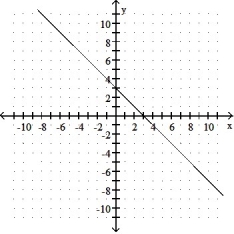
A) positive
B) zero
C) negative
D) undefined
-

A) positive
B) zero
C) negative
D) undefined

Unlock Deck
Unlock for access to all 59 flashcards in this deck.
Unlock Deck
k this deck
21
Determine whether the slope of the line is positive, negative, zero, or undefined:
-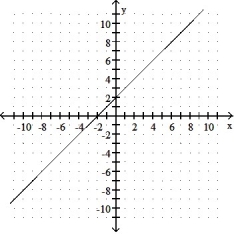
A) zero
B) undefined
C) negative
D) positive
-

A) zero
B) undefined
C) negative
D) positive

Unlock Deck
Unlock for access to all 59 flashcards in this deck.
Unlock Deck
k this deck
22
Determine whether the slope of the line is positive, negative, zero, or undefined:
-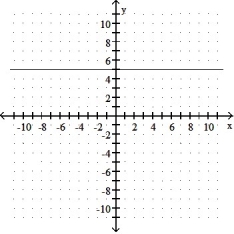
A) positive
B) negative
C) zero
D) undefined
-

A) positive
B) negative
C) zero
D) undefined

Unlock Deck
Unlock for access to all 59 flashcards in this deck.
Unlock Deck
k this deck
23
Determine whether the slope of the line is positive, negative, zero, or undefined:
-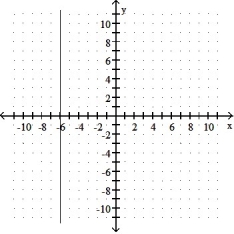
A) negative
B) zero
C) undefined
D) positive
-

A) negative
B) zero
C) undefined
D) positive

Unlock Deck
Unlock for access to all 59 flashcards in this deck.
Unlock Deck
k this deck
24
Graph the linear equation and determine its slope, if it exists:
-3x + 5y = 11
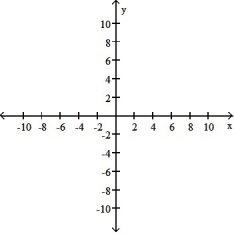
A)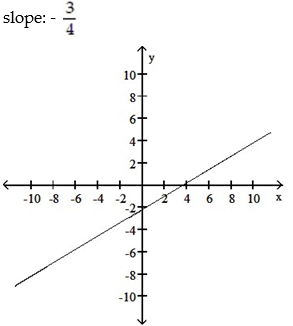
B)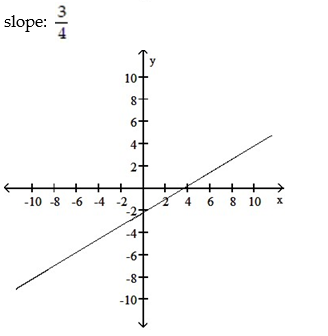
C)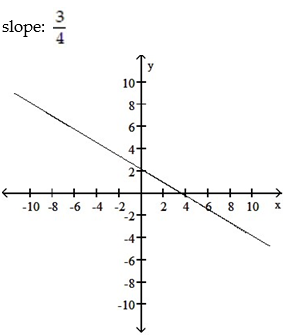
D)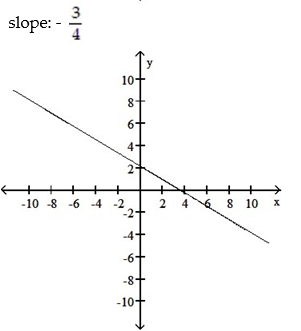
-3x + 5y = 11

A)

B)

C)

D)


Unlock Deck
Unlock for access to all 59 flashcards in this deck.
Unlock Deck
k this deck
25
Graph the linear equation and determine its slope, if it exists:
-2x - 5y = 20
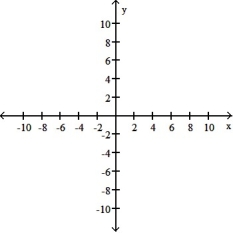
A)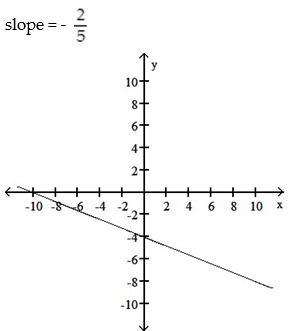
B)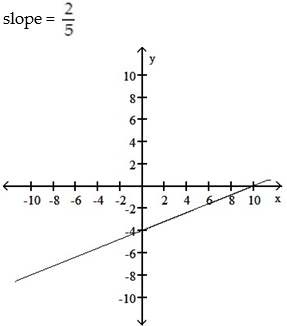
C)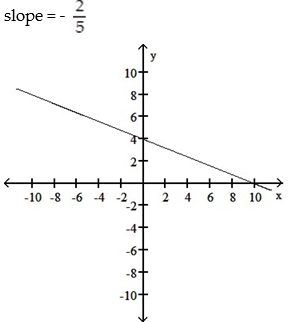
D)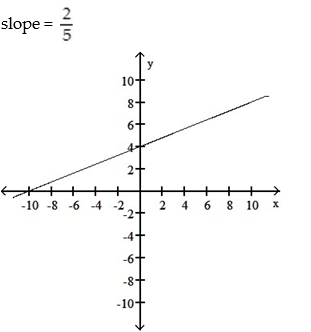
-2x - 5y = 20

A)

B)

C)

D)


Unlock Deck
Unlock for access to all 59 flashcards in this deck.
Unlock Deck
k this deck
26
Find the slope and y intercept of the graph of the equation:
-y = 2x - 6
A) Slope = 2, y intercept = 6
B) Slope = -6, y intercept = 2
C) Slope = 6, y intercept = 2
D) Slope = 2, y intercept = -6
-y = 2x - 6
A) Slope = 2, y intercept = 6
B) Slope = -6, y intercept = 2
C) Slope = 6, y intercept = 2
D) Slope = 2, y intercept = -6

Unlock Deck
Unlock for access to all 59 flashcards in this deck.
Unlock Deck
k this deck
27
Find the slope and y intercept of the graph of the equation:
-
A)
B)
C)
D)
-

A)

B)

C)

D)


Unlock Deck
Unlock for access to all 59 flashcards in this deck.
Unlock Deck
k this deck
28
Find the slope and y intercept of the graph of the equation:
-
A)
B)
C)
D)
-

A)

B)

C)

D)


Unlock Deck
Unlock for access to all 59 flashcards in this deck.
Unlock Deck
k this deck
29
Find the slope and y intercept of the graph of the equation:
-
A)
B)
C)
D)
-

A)

B)

C)

D)


Unlock Deck
Unlock for access to all 59 flashcards in this deck.
Unlock Deck
k this deck
30
Find the slope and y intercept of the graph of the equation:
-y = x + 3
A) Slope = 3; y intercept = 1
B) Slope = 1; y intercept = 3
C) Slope = 0; y intercept = -3
D) Slope = 3; y intercept = -1
-y = x + 3
A) Slope = 3; y intercept = 1
B) Slope = 1; y intercept = 3
C) Slope = 0; y intercept = -3
D) Slope = 3; y intercept = -1

Unlock Deck
Unlock for access to all 59 flashcards in this deck.
Unlock Deck
k this deck
31
Write an equation of the line with the indicated slope and y intercept:
-Slope = 2, y intercept = -4
A) y = 2x - 4
B) y = 4x + 2
C) y = -2x - 4
D) y = 4x - 2
-Slope = 2, y intercept = -4
A) y = 2x - 4
B) y = 4x + 2
C) y = -2x - 4
D) y = 4x - 2

Unlock Deck
Unlock for access to all 59 flashcards in this deck.
Unlock Deck
k this deck
32
Write an equation of the line with the indicated slope and y intercept:
-Slope = -3, y intercept = 5
A) y = 5x - 3
B) y = 3x + 5
C) y = -3x - 5
D) y = -3x + 5
-Slope = -3, y intercept = 5
A) y = 5x - 3
B) y = 3x + 5
C) y = -3x - 5
D) y = -3x + 5

Unlock Deck
Unlock for access to all 59 flashcards in this deck.
Unlock Deck
k this deck
33
Write an equation of the line with the indicated slope and y intercept:
-
A)
B)
C)
D)
-

A)

B)

C)

D)


Unlock Deck
Unlock for access to all 59 flashcards in this deck.
Unlock Deck
k this deck
34
Write an equation of the line with the indicated slope and y intercept:
-
A)
B)
C)
D)
-

A)

B)

C)

D)


Unlock Deck
Unlock for access to all 59 flashcards in this deck.
Unlock Deck
k this deck
35
Write an equation of the line with the indicated slope and y intercept:
-
A)
B)
C)
D)
-

A)

B)

C)

D)


Unlock Deck
Unlock for access to all 59 flashcards in this deck.
Unlock Deck
k this deck
36
Write an equation of the line with the indicated slope and y intercept:
-Slope = 1; y intercept = -5
A) y = -5x + 1
B) y = -x - 5
C) y = x - 5
D) y = -5x - 1
-Slope = 1; y intercept = -5
A) y = -5x + 1
B) y = -x - 5
C) y = x - 5
D) y = -5x - 1

Unlock Deck
Unlock for access to all 59 flashcards in this deck.
Unlock Deck
k this deck
37
Use the graph to find the slope-intercept form of the equation of the line. 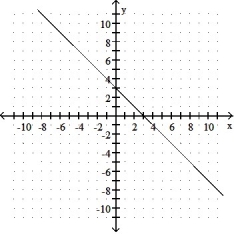
A) y = x + 3
B) y = -x + 3
C) y = x - 3
D) y = 3x

A) y = x + 3
B) y = -x + 3
C) y = x - 3
D) y = 3x

Unlock Deck
Unlock for access to all 59 flashcards in this deck.
Unlock Deck
k this deck
38
Write the equation of the line in the following graph. 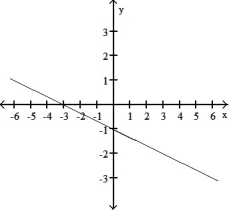
A) f(x) = -x + 1
B) f(x) =x + 1
C) f(x) =x - 1
D) f(x) = -x - 1

A) f(x) = -x + 1

B) f(x) =x + 1

C) f(x) =x - 1

D) f(x) = -x - 1


Unlock Deck
Unlock for access to all 59 flashcards in this deck.
Unlock Deck
k this deck
39
Find the slope of the line 3x + 4y = 11.
A)
B) -
C) 0
D) -
A)

B) -

C) 0
D) -


Unlock Deck
Unlock for access to all 59 flashcards in this deck.
Unlock Deck
k this deck
40
Use the graph to find the slope, x-intercept and y-intercept of the line.
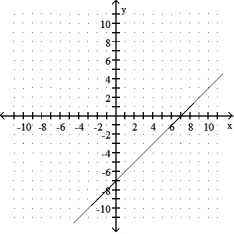
A)
B)
C)
D)

A)

B)

C)

D)


Unlock Deck
Unlock for access to all 59 flashcards in this deck.
Unlock Deck
k this deck
41
Graph the linear function defined by f(x) =  x + 2 and indicate the slope and intercepts.
x + 2 and indicate the slope and intercepts.
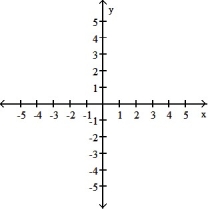
A)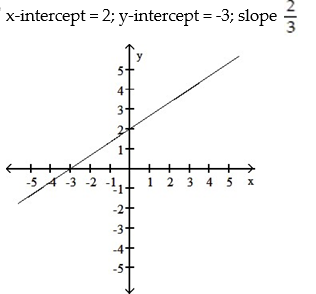
B)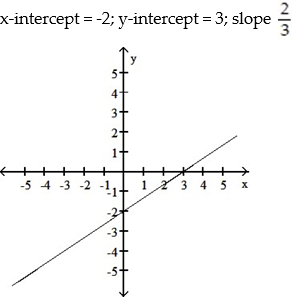
C)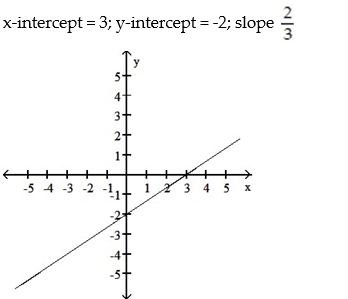
D)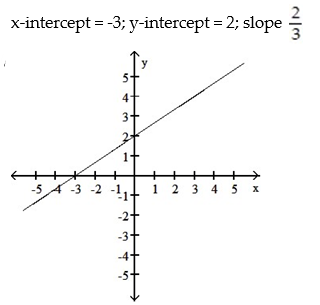
 x + 2 and indicate the slope and intercepts.
x + 2 and indicate the slope and intercepts.
A)

B)

C)

D)


Unlock Deck
Unlock for access to all 59 flashcards in this deck.
Unlock Deck
k this deck
42
Graph the equation:
-42 + 6y = 0
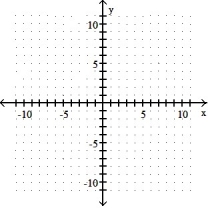
A)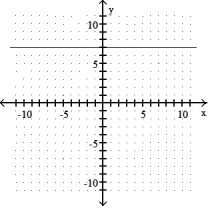
B)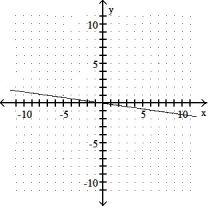
C)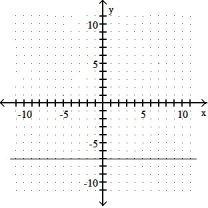
D)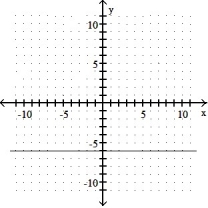
-42 + 6y = 0

A)

B)

C)

D)


Unlock Deck
Unlock for access to all 59 flashcards in this deck.
Unlock Deck
k this deck
43
Find the standard form of the equation of the line with slope of -  and passing through (4, 4).
and passing through (4, 4).
A) 2x + 7y = - 36
B) 2x + 7y = 36
C) 7x + 2y = - 36
D) 2x - 7y = 36
 and passing through (4, 4).
and passing through (4, 4).A) 2x + 7y = - 36
B) 2x + 7y = 36
C) 7x + 2y = - 36
D) 2x - 7y = 36

Unlock Deck
Unlock for access to all 59 flashcards in this deck.
Unlock Deck
k this deck
44
Find the slope of the line containing the given points:
-( 5, -3); ( -8, 2)
A) -
B)
C) -
D)
-( 5, -3); ( -8, 2)
A) -

B)

C) -

D)


Unlock Deck
Unlock for access to all 59 flashcards in this deck.
Unlock Deck
k this deck
45
Find the slope of the line containing the given points:
-(-5, 2) and (0, 2)
A) 0
B)
C) -
D) Undefined
-(-5, 2) and (0, 2)
A) 0
B)

C) -

D) Undefined

Unlock Deck
Unlock for access to all 59 flashcards in this deck.
Unlock Deck
k this deck
46
Write the equation of a line that passes through (3, 9) and (0, -7). Write the final answer in the form  where A, B, and C are integers with no common divisors (other than ±1) and
where A, B, and C are integers with no common divisors (other than ±1) and 
A) 16x - 3y = -21
B) 16x - 3y = 21
C) -16x + 3y = 21
D) 3x - 16y = 21
 where A, B, and C are integers with no common divisors (other than ±1) and
where A, B, and C are integers with no common divisors (other than ±1) and 
A) 16x - 3y = -21
B) 16x - 3y = 21
C) -16x + 3y = 21
D) 3x - 16y = 21

Unlock Deck
Unlock for access to all 59 flashcards in this deck.
Unlock Deck
k this deck
47
Write the equation of a line that passes through (-1, 4) and (5, -1). Write the final answer in the form  where A, B, and C are integers with no common divisors (other than ±1) and
where A, B, and C are integers with no common divisors (other than ±1) and 
A) 5x + 6y = -19
B) 5x - 6y = 19
C) 5x + 6y = 19
D) -5x + 6y = 19
 where A, B, and C are integers with no common divisors (other than ±1) and
where A, B, and C are integers with no common divisors (other than ±1) and 
A) 5x + 6y = -19
B) 5x - 6y = 19
C) 5x + 6y = 19
D) -5x + 6y = 19

Unlock Deck
Unlock for access to all 59 flashcards in this deck.
Unlock Deck
k this deck
48
A small company that makes hand-sewn leather shoes has fixed costs of $320 a day, and total costs of $1200 per day at an output of 20 pairs of shoes per day. Assume that total cost C is linearly related to output x. Find an equation of the line relating output to cost. Write the final answer in the form 
A) C = 44x + 320
B) C = 60x + 320
C) C = 44x + 1520
D) C = 60x + 1520

A) C = 44x + 320
B) C = 60x + 320
C) C = 44x + 1520
D) C = 60x + 1520

Unlock Deck
Unlock for access to all 59 flashcards in this deck.
Unlock Deck
k this deck
49
The mathematical model  represents the cost in dollars a company has in manufacturing x items during a month. Using this model, how much does it cost to produce 600 items?
represents the cost in dollars a company has in manufacturing x items during a month. Using this model, how much does it cost to produce 600 items?
A) $50.00
B) $0.08
C) $390,000
D) $360,000
 represents the cost in dollars a company has in manufacturing x items during a month. Using this model, how much does it cost to produce 600 items?
represents the cost in dollars a company has in manufacturing x items during a month. Using this model, how much does it cost to produce 600 items?A) $50.00
B) $0.08
C) $390,000
D) $360,000

Unlock Deck
Unlock for access to all 59 flashcards in this deck.
Unlock Deck
k this deck
50
Use the graph to find the average rate of change:
-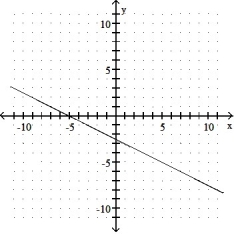
A) 2
B) -
C) - 2
D)
-

A) 2
B) -

C) - 2
D)


Unlock Deck
Unlock for access to all 59 flashcards in this deck.
Unlock Deck
k this deck
51
Use the graph to find the average rate of change:
-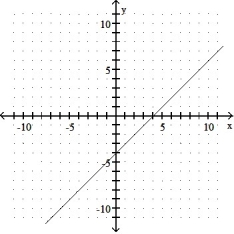
A) 1
B) -4
C) -1
D) 4
-

A) 1
B) -4
C) -1
D) 4

Unlock Deck
Unlock for access to all 59 flashcards in this deck.
Unlock Deck
k this deck
52
Given two points (  ,
,  ) and (
) and (  ,
,  ), the ratio of the change in y to the change in x is called.
), the ratio of the change in y to the change in x is called.
A) x-intercept
B) slope
C) equilibrium point
D) break-even point
 ,
,  ) and (
) and (  ,
,  ), the ratio of the change in y to the change in x is called.
), the ratio of the change in y to the change in x is called.A) x-intercept
B) slope
C) equilibrium point
D) break-even point

Unlock Deck
Unlock for access to all 59 flashcards in this deck.
Unlock Deck
k this deck
53
Use the REGRESSION feature on a graphing calculator:
-The paired data below consists of the temperature on randomly chosen days and the amount of a certain kind of plant grew (in millimeters).

Find the linear function that predicts a plant's growth as a function of the temperature. Round your answer to two decimal places.
A)
B) y = 14..57x + 0.21
C) y = 0.21x + 14.57
D)
-The paired data below consists of the temperature on randomly chosen days and the amount of a certain kind of plant grew (in millimeters).

Find the linear function that predicts a plant's growth as a function of the temperature. Round your answer to two decimal places.
A)

B) y = 14..57x + 0.21
C) y = 0.21x + 14.57
D)


Unlock Deck
Unlock for access to all 59 flashcards in this deck.
Unlock Deck
k this deck
54
Use the REGRESSION feature on a graphing calculator:
-The use of bottled water in the United States has shown a steady increase in recent years. The table shows the annual per capita consumption for the years 1995 - 2001.

With x being the years since 1995, find the linear function that represents this data. Round your answer to two decimal places.
A) y = 0.89x + 4.07
B)
C) y = 4.07x + 0.89
D)
-The use of bottled water in the United States has shown a steady increase in recent years. The table shows the annual per capita consumption for the years 1995 - 2001.

With x being the years since 1995, find the linear function that represents this data. Round your answer to two decimal places.
A) y = 0.89x + 4.07
B)

C) y = 4.07x + 0.89
D)


Unlock Deck
Unlock for access to all 59 flashcards in this deck.
Unlock Deck
k this deck
55
Use the REGRESSION feature on a graphing calculator:
-A study was conducted to compare the average time spent in the lab each week versus course grade for computer students. The results are recorded in the table below.

Use linear regression to find a linear function that predicts a student's course grade as a function of the number of hours spent in lab.
A) y = 0.930 + 44.3x
B) y = 44.3 + 0.930x
C) y = 88.6 - 1.86x
D) y = 1.86 + 88.6x
-A study was conducted to compare the average time spent in the lab each week versus course grade for computer students. The results are recorded in the table below.

Use linear regression to find a linear function that predicts a student's course grade as a function of the number of hours spent in lab.
A) y = 0.930 + 44.3x
B) y = 44.3 + 0.930x
C) y = 88.6 - 1.86x
D) y = 1.86 + 88.6x

Unlock Deck
Unlock for access to all 59 flashcards in this deck.
Unlock Deck
k this deck
56
Use the REGRESSION feature on a graphing calculator:
-In the table below, x represents the number of years since 2000 and y represents sales (in thousands of dollars) of a clothing company. Use the regression equation to estimate sales in the year 2006. Round to the nearest thousand dollars.

A) $8,000
B) $20,000
C) $14,000
D) $2,000
-In the table below, x represents the number of years since 2000 and y represents sales (in thousands of dollars) of a clothing company. Use the regression equation to estimate sales in the year 2006. Round to the nearest thousand dollars.

A) $8,000
B) $20,000
C) $14,000
D) $2,000

Unlock Deck
Unlock for access to all 59 flashcards in this deck.
Unlock Deck
k this deck
57
Use the REGRESSION feature on a graphing calculator:
-For some reason the quality of production decreased as the year progressed at a flash drive manufacturing plant. The following data represent the percentage of defective flash drives produced at the plant in the corresponding month of the year.

Use the regression equation with values rounded to four decimals to predict the percentage of defective drives in month 6, June.
A) 2.20%
B) 2.3%
C) 2.15%
D) 2.0%
-For some reason the quality of production decreased as the year progressed at a flash drive manufacturing plant. The following data represent the percentage of defective flash drives produced at the plant in the corresponding month of the year.

Use the regression equation with values rounded to four decimals to predict the percentage of defective drives in month 6, June.
A) 2.20%
B) 2.3%
C) 2.15%
D) 2.0%

Unlock Deck
Unlock for access to all 59 flashcards in this deck.
Unlock Deck
k this deck
58
Use the REGRESSION feature on a graphing calculator:
-Efficiency experts rate employees according to job performance and attitude. The results for several randomly selected employees are given below.

Find the regression line which can be used to predict performance rating if attitude rating is known.
A) y = 11.7 + 1.02x
B) y = 92.3 - 0.669x
C) y = 2.81 + 1.35x
D) y = -47.3 + 2.02x
-Efficiency experts rate employees according to job performance and attitude. The results for several randomly selected employees are given below.

Find the regression line which can be used to predict performance rating if attitude rating is known.
A) y = 11.7 + 1.02x
B) y = 92.3 - 0.669x
C) y = 2.81 + 1.35x
D) y = -47.3 + 2.02x

Unlock Deck
Unlock for access to all 59 flashcards in this deck.
Unlock Deck
k this deck
59
Suppose the sales of a particular brand of MP3 player satisfy the relationship  , where S represents the number of sales in year x, with
, where S represents the number of sales in year x, with  corresponding to 2002 . Find the number of sales in 2005.
corresponding to 2002 . Find the number of sales in 2005.
A) 12,600
B) 6400
C) 4400
D) 4200
 , where S represents the number of sales in year x, with
, where S represents the number of sales in year x, with  corresponding to 2002 . Find the number of sales in 2005.
corresponding to 2002 . Find the number of sales in 2005.A) 12,600
B) 6400
C) 4400
D) 4200

Unlock Deck
Unlock for access to all 59 flashcards in this deck.
Unlock Deck
k this deck


